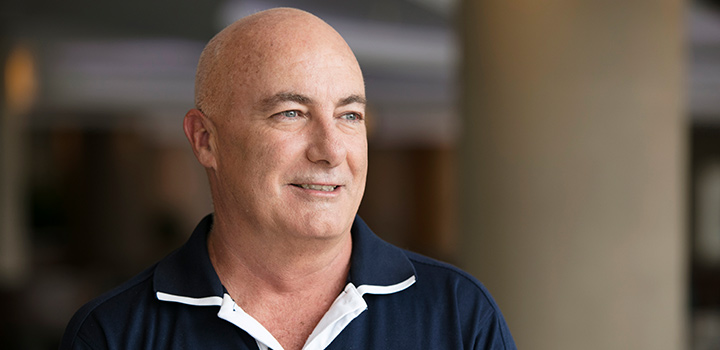My Apple Watch saved my life

When Russell Pengelly got his first Apple Watch, he planned to use it to get healthier through Vitality. Little did he know it would end up saving his life.
Entrepreneur and the father of two, Russell Pengelly lives a fast-paced lifestyle. In February 2017, the 54 year-old Capetonian found himself between meetings during a typical work day of running his educational software business. A gym-goer, he'd developed a habit of regularly checking his Apple Watch.
"My pulse reading was 160 beats per minute. I put it down to my excitement over developments at work," he says. "It was also hot and I'd had about five or six diet cooldrinks," he adds. "But, in the back of my mind, I knew something was wrong."
Russell's pulse remained elevated all afternoon and through the night. After urgent consultation with his GP, an ECG and emergency meds, he found himself opposite his cardiologist, who, to Russell's shock, couldn't believe he was still alive and kicking.
Russell was suffering from a condition known as atrial fibrillation - a form of irregular heartbeat that can lead to poor blood flow, clots, stroke, and heart failure. His cardiologist used cardioversion, a technique that uses electricity to treat an abnormal heart rate, to restore his cardiac rhythm to normal.
It was Russell's vigilance and ability to measure his heart rate in real time on his Apple Watch that saved his life. "I wanted to use my Apple Watch to get healthier through Vitality, but it ended up saving my life," he reflects.
The potential of hi-tech wearables
Wearable tracking devices are increasingly able to monitor and store a plethora of data about the wearer.
"Behaviour modification is most effective when it's in real time, and we're just starting to crack that nut," says Pelu Tran, a top US medical device innovator and the founder of Augmedix.
"Imagine if, in addition to tracking how far you walk, your wearable also provided real-time suggestions. What if your device could detect the approach of your next appointment and remind you to leave a few minutes earlier so you could take a longer route, or suggest that you take the stairs instead of the elevator?"
You can read more about the advantages of getting a high-tech wearable device in Why you should get a fitness device
New technologies enable speedy intervention
Wearable and ingestible devices that monitor and transmit data in real time can track systems as varied as gut health, heart rate, activity levels, stress and insulin levels, and more.
Discovery Vitality rewards members who monitor their behaviour using mobile fitness and health devices and who help prevent lifestyle-related diseases by making deliberate healthy choices every day.
"These new technologies empower patients to take responsibility for their health and enable doctors and caregivers to intervene almost instantly," says Dr Ryan Noach, Deputy CEO of Discovery Health.
"Our focus is always to empower members and doctors to better manage their health, as well as to improve coordination and quality of care using the best available tools."
Stay healthy and get rewarded
With Discovery Card, you can now activate Vitality Active Rewards with Apple Watch and get Apple Watch Series 2. Meet your Vitality targets and you can pay for your Watch in workouts rather than rands!
Plus, find out how Discovery Vitality can help you lead a healthy life and get rewarded for it at loads of exciting lifestyle partners like kulula.com, Ster-Kinekor, KAUAI and more.
Related articles
Pushing limits and shedding pounds: How Dumi found a sport she loves
Spring brings a scurry of activity as the earth bursts into life. Use this season to fall in love with a fitness activity that keeps you coming back for more. Dumisile Mthalane did just that. By finding a sport where she can soak up the sunshine, she's transformed the way she looks, thinks and feels.
Why you should get a fitness device
It's about far more than just keeping the time: get a fitness device and you're on your way to a healthier, more active lifestyle.
Busy? We get it. Haven't exercised since last January, or the January before that? No problem. Starting a running programme (and sticking with it) is easier than you think. First things first: you need to get your body - and your head - prepped for running.